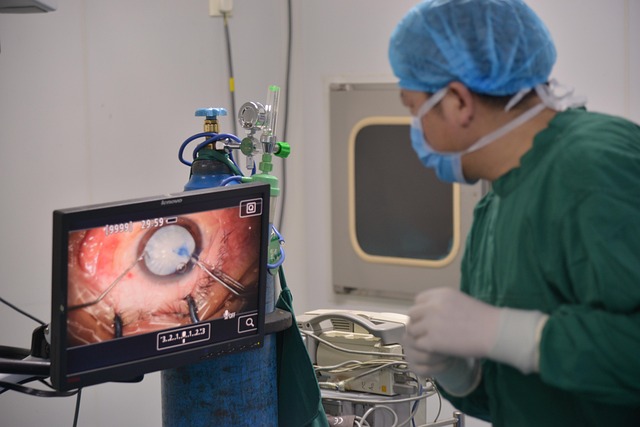Egg donation offers valuable pregnancy options for individuals facing fertility challenges due to conditions like ovarian cysts and surgeries like cystectomy. It involves a matching system based on medical history, lifestyle, and compatibility, with informed consent and respect for donor autonomy as key ethical considerations. After cystectomy, understanding future fertility and exploring advanced reproductive technologies (ART), such as IVF, are essential. Balancing family dreams with confidentiality in egg donation programs requires transparency to build trust while respecting donors' privacy rights.
“Navigating ethical considerations in egg donation is a complex yet crucial aspect of modern reproductive healthcare. This process, driven by voluntary participation, raises critical questions around consent, autonomy, and donor privacy. With medical advancements like ovarian cystectomy opening new pregnancy options, understanding the ethical landscape becomes imperative. We explore these dimensions, from the fundamentals of egg donation to post-cystectomy considerations, offering insights that balance family aspirations with ethical integrity.”
Understanding Egg Donation: A Voluntary Process
Egg donation is a voluntary process that offers women the opportunity to contribute to another’s journey towards pregnancy, especially those facing fertility challenges due to conditions like ovarian cysts and subsequent surgeries, including ovarian cystectomy. This act of generosity plays a significant role in expanding pregnancy options for individuals who may otherwise struggle to conceive.
Understanding this process is crucial, as it involves the careful matching of donors with recipients based on medical history, lifestyle factors, and compatibility. The voluntary nature ensures that all parties involved are fully informed and comfortable with the decision, fostering an ethical framework that respects both the donor’s and recipient’s autonomy.
Ethical Dilemmas: Consent and Autonomy
In the context of egg donation, ethical dilemmas often revolve around consent and autonomy, particularly as it relates to potential donors and recipients. Consent is a cornerstone of any medical procedure, including egg donation, ensuring that individuals fully understand the risks, benefits, and implications involved. For donors, this means providing informed consent, which includes recognizing the permanence of the decision to donate and its potential impact on their fertility. It also involves understanding the various procedures and processes they will undergo.
Autonomy is equally crucial, as it pertains to the right of individuals to make decisions about their bodies. In the case of egg donation, this means ensuring that donors are free from coercion or undue influence. This is especially important when considering individuals who may be facing medical conditions like ovarian cysts, which could lead to procedures such as ovarian cystectomy. After ovarian cystectomy, some women explore pregnancy options and might consider egg donation as a viable alternative. Ethical considerations in this context demand that donors’ autonomy is respected at every step, allowing them to make choices that align with their personal values, health, and life goals.
Medical Considerations Post Ovarian Cystectomy
After an ovarian cystectomy, understanding the medical considerations for future fertility and pregnancy options is paramount. While this procedure aims to remove benign growths, it’s crucial to recognize that it may impact a woman’s ability to conceive naturally. The surgery itself can cause changes in the ovary’s structure and function, potentially affecting hormone levels and egg production. Therefore, individuals considering ovarian cystectomy should consult with specialized healthcare providers who can offer guidance on the potential long-term effects.
For those interested in pursuing pregnancy after the procedure, exploring advanced reproductive technologies (ART) like in-vitro fertilization (IVF) may be necessary. These treatments can compensate for any remaining fertility challenges, providing a promising path to parenthood. It’s essential to discuss these options with experts who can assess individual cases and recommend suitable strategies, ensuring the best outcomes while navigating the complex landscape of post-cystectomy healthcare.
Balancing Family Dreams: Donor Privacy & Transparency
In the quest for parenthood, many couples explore various pregnancy options after ovarian cystectomy, including egg donation as a viable alternative. This raises important ethical dilemmas regarding donor privacy and transparency. While donors may wish to remain anonymous to protect their personal information and identity, potential recipients often seek insight into the woman behind the eggs. Striking a balance between fulfilling family dreams and preserving donor confidentiality is an intricate task.
Transparency in egg donation programs can foster trust and connection while ensuring donors’ rights. Open communication about the donation process, including the possibility of future contact with recipients (if both parties agree), can empower donors to make informed choices. At the same time, protecting their privacy allows them to maintain control over how much information they share, providing a safe space for women to contribute to family-building efforts without compromising their identity or personal boundaries.
Navigating ethical considerations in egg donation involves a delicate balance between personal autonomy, donor privacy, and ensuring the safety of both donor and recipient. As we’ve explored, understanding the voluntary nature of egg donation, addressing medical concerns like those arising from ovarian cystectomy, and promoting transparency while respecting donor privacy are essential steps. By carefully considering these aspects, we can foster a supportive environment that allows individuals to access diverse pregnancy options while upholding ethical standards in this life-changing process.
